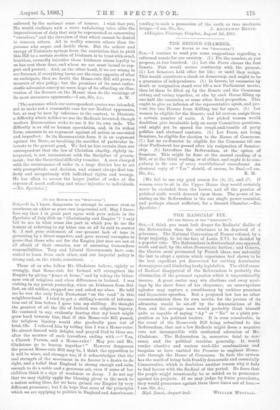THE SECOND CHAMBER.
[To nu{ EDITOR OF THE "SPECTATOR."] SIR,—I venture to send you some suggestions regarding a reformed senate for our country. (1.) Fix the number, as you propose, at two hundred. (2.) Let the Peers choose the first Senate. This would secure continuity with the present. (3.) Let Senators hold office for life; or until they resign. This would constitute a check on democracy, and ought to be a guarantee of independence. (4.) In future, let vacancies by death or resignation stand over till a new Parliament meets; then let them be filled up by the Senate and the Commons sitting and voting together, or else by each House filling up one-half the vacancies, or some other fixed proportion. This ought to give an infusion of the representative spirit, and pre- vent the two Houses from drifting too far apart. (5.) Let women be eligible for the Senate; and let custom assign theta a certain number of seats. A few picked women would doubtless give invaluable help on many Committee questions, and might yet be spared the rough-and-tumble of party politics and electoral contests. (6.) Let Peers, not being Senators, be eligible for election to the House of Commons. (7.) Let no ex-Senator be eligible for the Commons till one clear Parliament has passed after his resignation of Senator- ship. (8.) Introduce the Referendum, at the option of Senators. This might be done at the second reading of a Bill, or at the third reading, or at either, and ought to be com- pulsory in the case of every constitutional amendment. An electoral reply of "Yes" should, of course, be final.—I am, [We fail to see any good reason for (4), (5), and (7). If women were to sit in the Upper House they would certainly never be excluded from the Lower, and all the passion of political strife would descend upon them. The power of in- sisting on the Referendum is the one single power essential, and perhaps almost sufficient, for a Second Chamber.—ED. Spectator.]


































 Previous page
Previous page